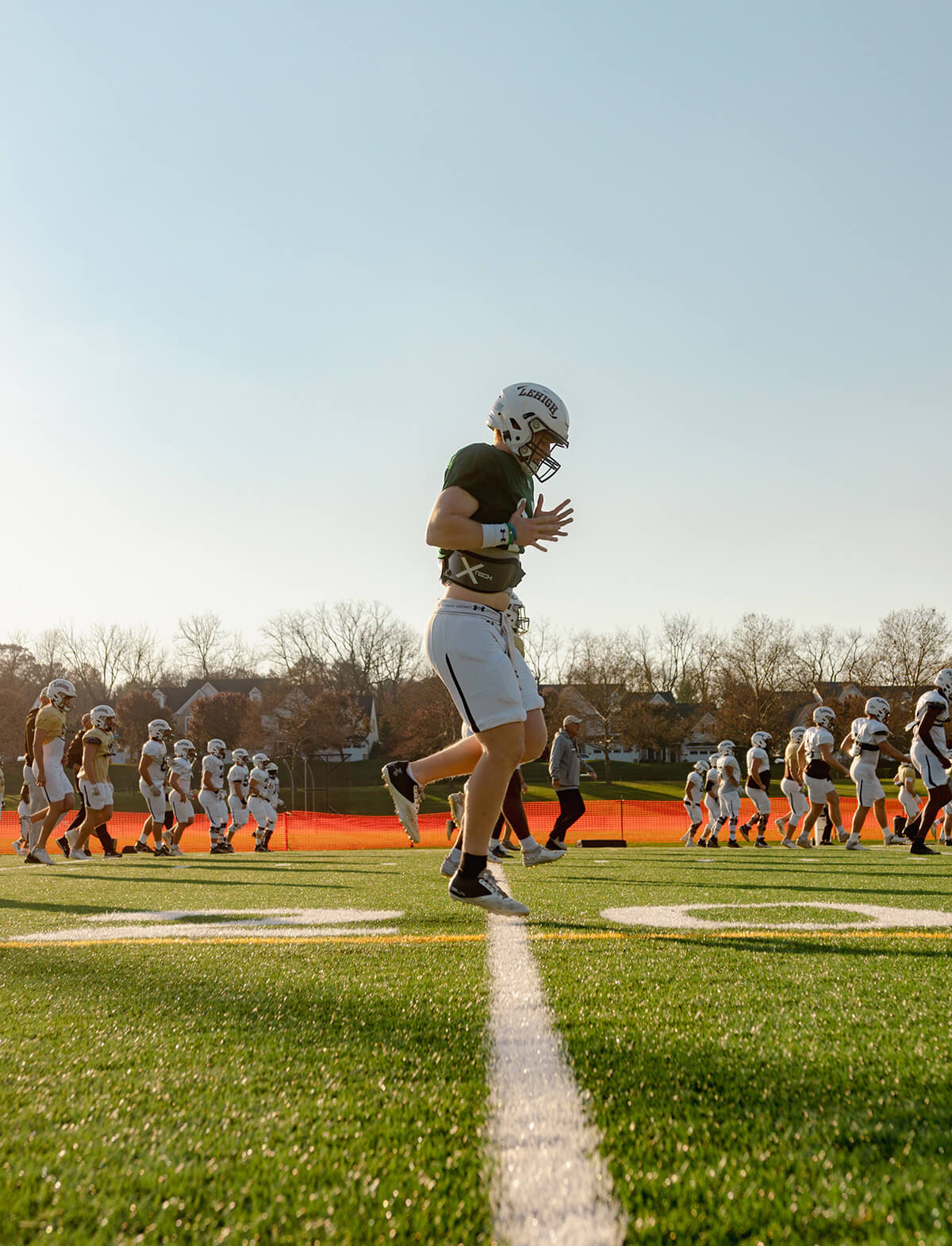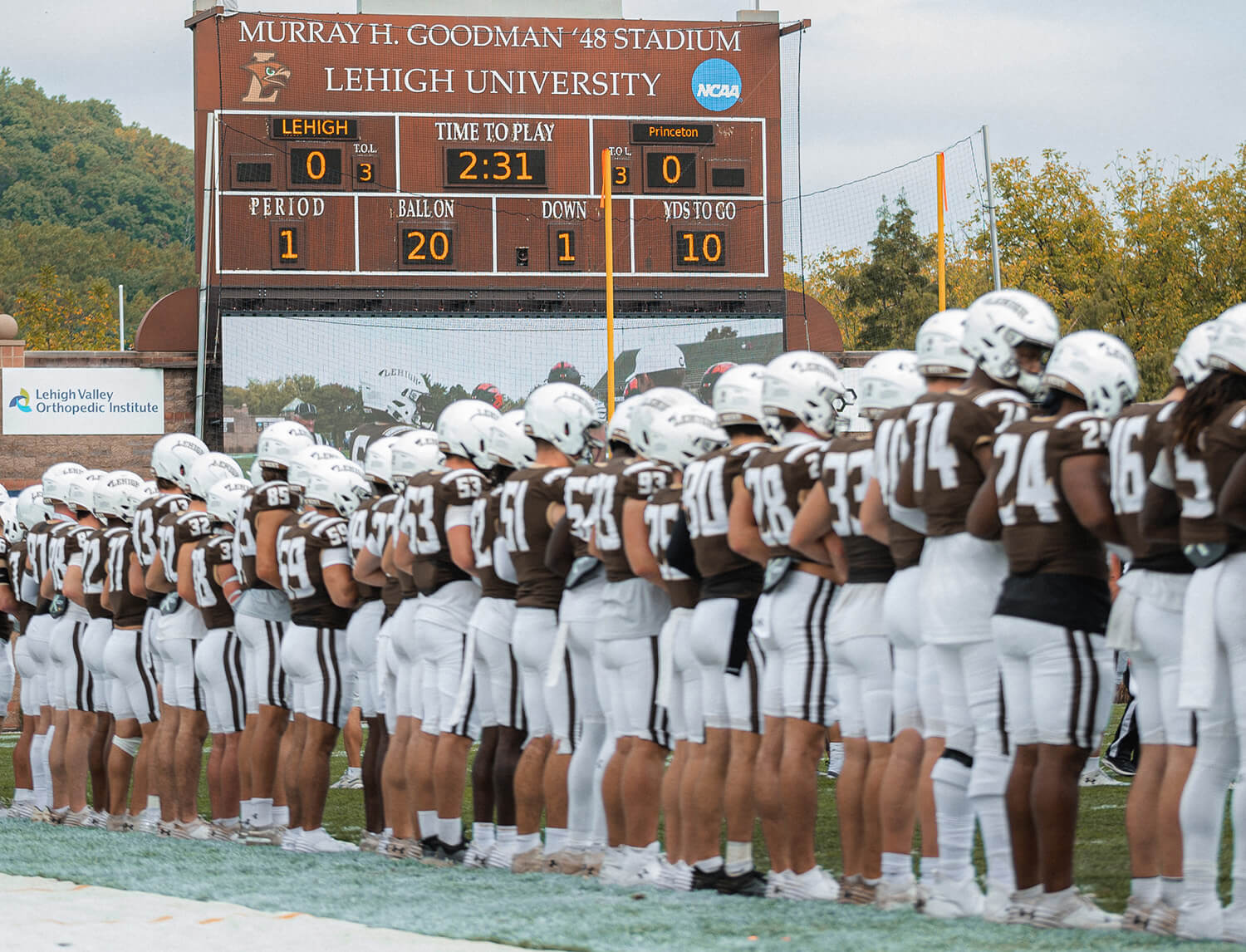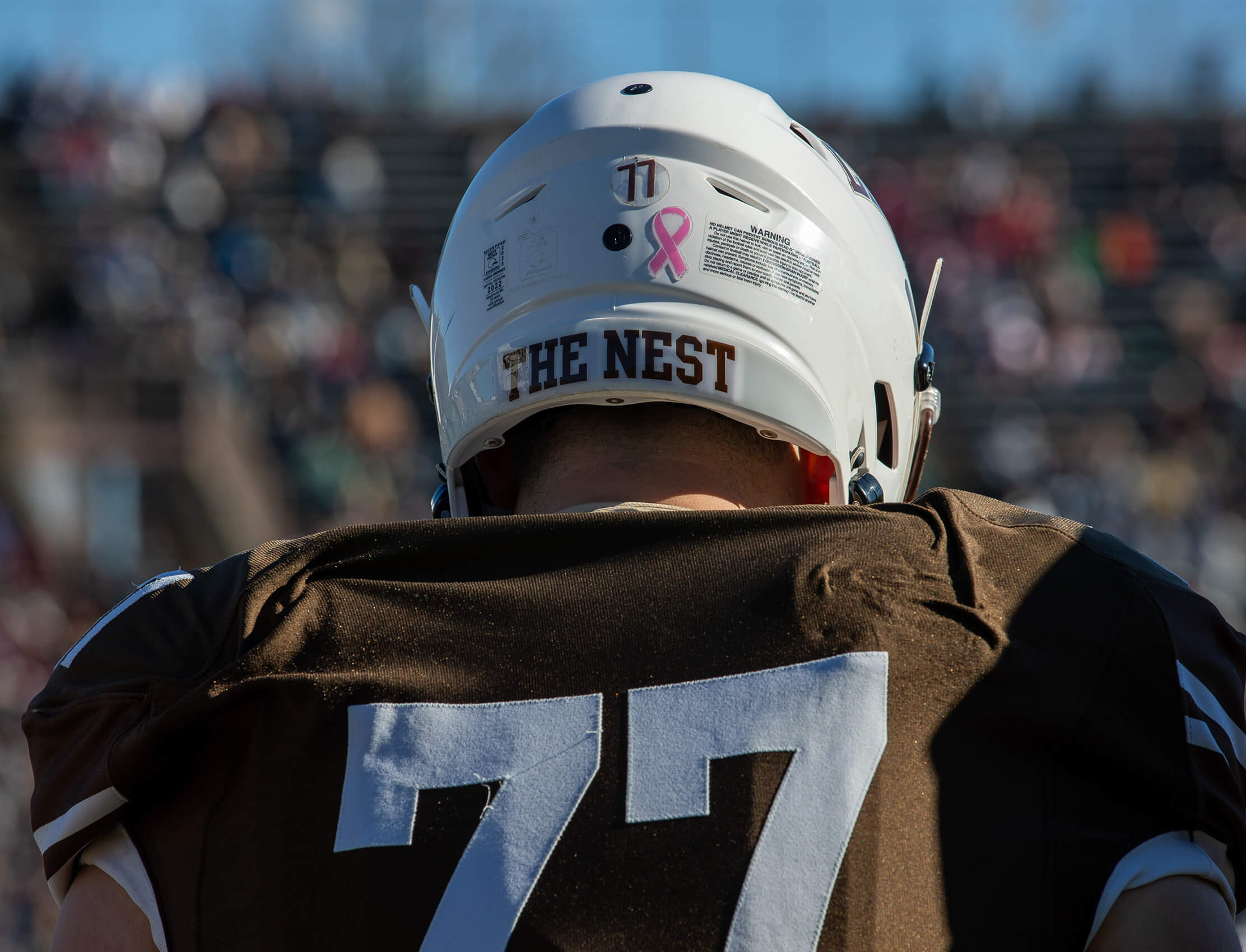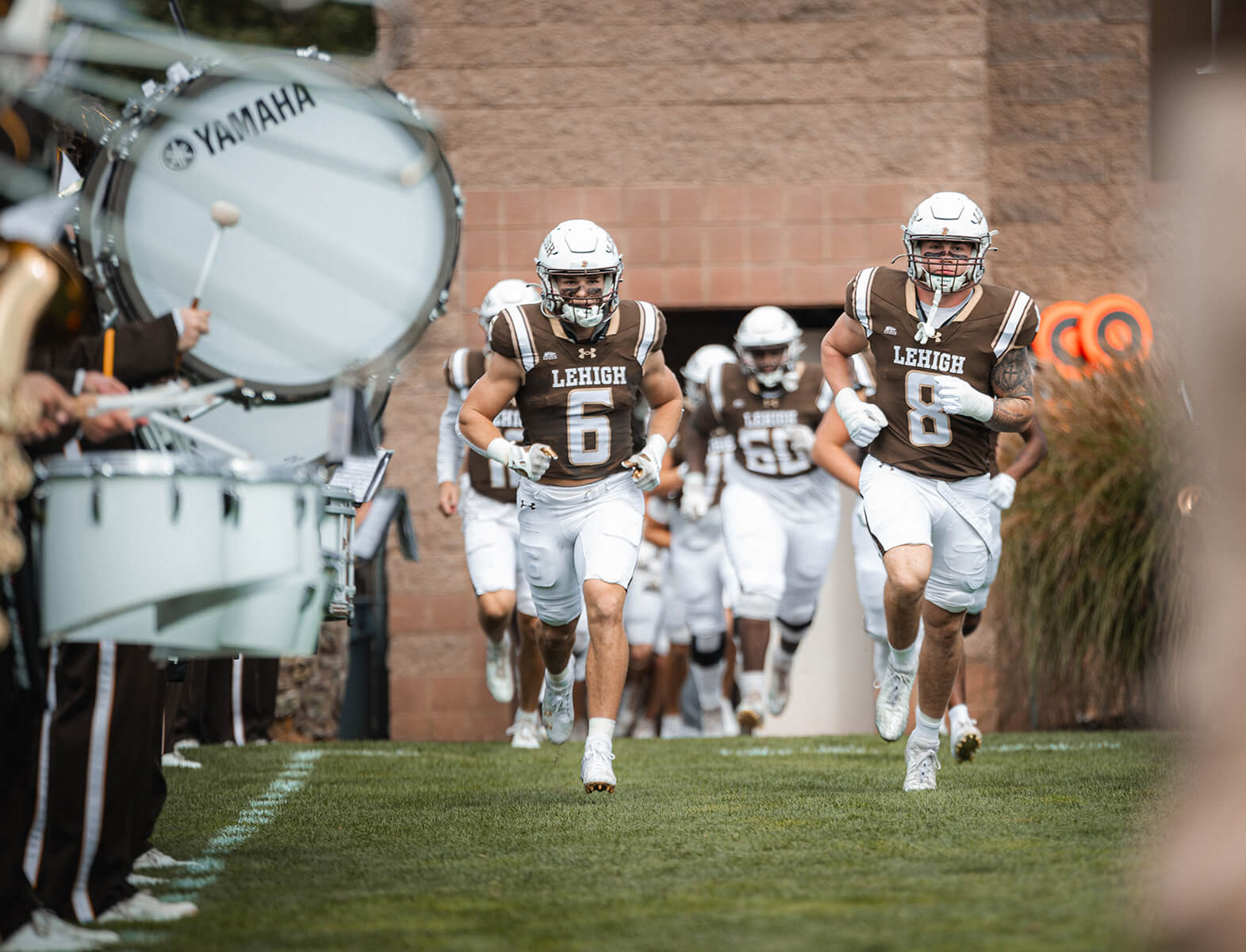
The physical demands on a Lehigh football player are significant. These players volunteer to work on strength training through the summer with their strength coach, and upon reporting to pre-season camp on July 30, they are committed to 6 days/20 hours each week of lifting in the gym, conditioning, meetings, and practice time to prepare for 11–12 games each season.
Beyond the physical demands is the psychological lift of maintaining a minimum 2.0 GPA, with a goal of achieving a 3.2 GPA as a team. Plus, the freshmen players are still adjusting to life away from their family for the first time.
It’s not uncommon for NCAA Division I athletes to experience burnout, loneliness, anxiety, and general stress. Luckily for Lehigh student-athletes, Aaron Sterba, director of Counseling and Psychological Services (UCPS), and the UCPS sport psychology team are active partners with Lehigh Athletics, aiming to manage these types of challenges to their success on and off the field.
Sterba gave us the inside scoop on some ways sports psychology serves our Mountain Hawks so they can perform at their best and tackle a high-pressure game like Lehigh-Lafayette while still enjoying the time-honored tradition.
Normalizing Support
“It has become much more common for student-athletes to have worked with a psychologist and be open to it,” Sterba recognizes.
“Here at Lehigh, we try to do our best to have staff members that connect with the team so they are a familiar face like the athletic trainer or assistant coaches,” Sterba says, noting that this makes it much more likely for students and leadership to access the support regularly.
Athletes aren’t the only students who benefit from this type of engagement with UCPS. “We do the same with many groups across campus such as the Office of International Students and Scholars, the Graduate Life Office, or Fraternity and Sorority Affairs." Making access to psychological support and counseling visible and easy across campus is one of Sterba’s top goals with UCPS.
Performance Consistency

Mental barriers that commonly interfere with a player’s ability to perform consistently vary, so Sterba says the first step is often to identify what a high-performing day looks like.
“What are the factors that contribute to high performance? How many of those are you consistently hitting on?” he says, adding that the days leading up to a game may impact performance if a student isn’t eating right, sleeping well, or is juggling a heavy course load.
Another obstacle might be a player’s difficulty staying focused on the play in front of them. Anger, stress, or even excitement might pull them out of focus, so they need to find ways to manage those feelings. “If they can show to the game with their minds loose and free, their game will be much more reflective of that.”
Finding Balance
Sterba says, “There is an interaction of what's going on in your life and what performance looks like.” So, sports psychology includes taking time to understand how athletes are feeling emotionally and how those feelings impact their play.
“If we can help student-athletes understand why one day they feel energized and ready to focus and the next they don't, they can learn to manage that better to take care of themselves,” Sterba says. He will often ask questions about what they notice about how their performance is impacted by factors such as sleep, stressors in their relationships, and academic pressures. He says that while he often can't help eliminate the jitters, he can advise on regaining control to slow down the heart rate and bring their attention back to the task at hand.
“If they know how to bring their mind back to the task, they won’t feel as overwhelmed anymore.”
Sterba says that since every athlete is different, they need to do the work to figure out what strategies will work for them. “If they better understand who they are, they can plan and focus on regular parts of their routine that help them get ready to play.”
Injury Recovery
When an injured athlete can’t compete, it can sideline more than their season plans. UCPS offers support to meet each athlete’s needs.

“If they are out for the season or half the season, it's only natural to feel out of balance. Your life has been focused on your sport participation, and to not be able to do that can feel disorienting,” Sterba says.
He has also seen that once the injury is healed, there is often some hesitation and trust in the body that needs to be rebuilt. “Although doctors may have cleared them on a physical level, there is an adjustment [to] trust their knee to jump back on the field and play like their normal self. And if they have a recurring injury, they might sometimes experience fear to do that same move that has hurt their foot before.”
Sterba and the UCPS sport psychology team counsel athletes on how to reenter the game one step at a time to allow time to build trust in what the body needs to do to be successful on the field. He helps them recognize that the hesitation is a normal part of the process.
Building Trust
Sometimes a player’s success has nothing to do with their ability. It has to do with being socially comfortable with their team and coaches.
“If you are unsure about how your team feels about you, it makes it much harder to perform,” Sterba says. Understanding that and what your coach and teammates expect from you decreases the stress of uncertainty and makes it easier to deliver. “When that happens, your game ramps up.”
Preparing for “The Big Game”
When the pressure is on, coaches will sometimes bring sport psychologists in to make sure the players are truly focused on the right goals and know how to temper their adrenaline in the zone. “The likelihood is that they are really amped up for the game,” Sterba says. “But the game and expectations [can] take them too high, and if they don't have strategies to slow that process down, they can end up using up too much energy pregame or early in the competition.”

Sterba helps players find and maintain their “optimal zone of performance”: that sweet spot that allows a player to access the right amount of energy and not get ahead of themselves mentally.
“When you get overexcited, your body is not ready for it and you can literally find yourself tripping over your own feet on the field or court. Alternatively, some people will shut down in response to that kind of emotion and find their legs feeling heavier and slower than normal.”
To manage this, Sterba advises players on how to reset and make sure they are present. He says this is the beauty of a huddle in football or other pauses in various sports. These pauses offer an opportunity for the team to regroup, reset, get back on the same page, and move forward together.


